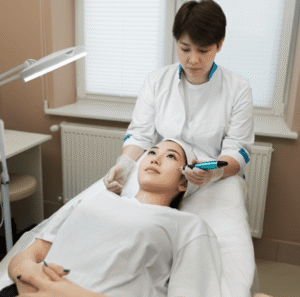Overview
Tinnitus is the perception of sound in the ears or head without an external source, often described as ringing, buzzing, hissing, or roaring. It is a common condition that can range from mild annoyance to severe impairment, affecting concentration, sleep, and quality of life. While tinnitus itself is not a disease, it often indicates underlying auditory, neurological, or systemic issues. South Korea offers advanced diagnostic and therapeutic options, including audiology assessments, imaging, and innovative treatments such as sound therapy, cognitive behavioral therapy (CBT), and specialized pharmacological management, making it a leading destination for tinnitus care in Asia.
What is Tinnitus?
Tinnitus is the perception of internal sound in the absence of an external auditory stimulus. It can be subjective, where only the patient hears the sound, or objective, which is rare and may be audible to a clinician using a stethoscope. Tinnitus can be acute, lasting a few days, or chronic, persisting for months or years. It often coexists with hearing loss, ear infections, exposure to loud noise, or underlying conditions such as Meniere’s disease or otosclerosis. While not life-threatening, chronic tinnitus can significantly affect mental health, productivity, and daily functioning.
Symptoms
The primary symptom of tinnitus is the perception of sound, which varies in intensity, frequency, and duration:
- Ringing in the ears (most common)
- Buzzing, hissing, roaring, clicking, or whistling sounds
- Perceived noise in one or both ears
- Fluctuating intensity: Sound may vary throughout the day
- Sleep disturbances: Difficulty falling or staying asleep due to persistent noise
- Concentration problems: Challenges in focusing at work, school, or daily activities
- Associated hearing issues: Partial hearing loss or hyperacusis (sensitivity to sound)
Tinnitus can be mild and occasional, or severe and continuous, significantly affecting quality of life.
Causes
Tinnitus can result from multiple underlying factors, often related to auditory or systemic dysfunction:
- Hearing loss: Age-related (presbycusis) or noise-induced hearing loss
- Ear infections: Otitis media or inner ear inflammation
- Earwax buildup: Cerumen impaction causing pressure on the eardrum
- Ototoxic medications: Certain antibiotics, chemotherapy agents, or NSAIDs
- Head or neck trauma: Injuries affecting the auditory system
- Neurological disorders: Meniere’s disease, vestibular schwannoma, or acoustic neuroma
- Systemic conditions: Hypertension, diabetes, anemia, thyroid disorders
- Stress and anxiety: Can exacerbate perception of tinnitus
In many cases, tinnitus results from a combination of hearing damage and altered brain signal processing in the auditory cortex.
Risk Factors
Certain individuals are more susceptible to developing tinnitus:
- Older age: Age-related hearing loss increases prevalence
- Exposure to loud noise: Occupational or recreational exposure to high-decibel environments
- Gender: Some studies suggest males are slightly more affected
- Chronic health conditions: Cardiovascular disease, diabetes, thyroid disorders
- Medications: Long-term use of ototoxic drugs
- Stress and psychological factors: Anxiety, depression, or high-stress lifestyle
- Family history: Genetic predisposition may contribute in some cases
Complications
While tinnitus is not directly dangerous, chronic or severe cases can lead to significant complications:
- Sleep disorders: Insomnia and disrupted sleep patterns
- Mental health issues: Anxiety, depression, and social withdrawal
- Reduced concentration and productivity: Difficulty focusing at work or school
- Hearing deterioration: If tinnitus coexists with progressive hearing loss
- Impact on daily life: Interference with communication, social interactions, and leisure activities
Timely assessment and intervention in South Korea can prevent these complications and improve overall well-being.
Prevention
Preventing tinnitus involves protecting the auditory system and managing underlying health conditions:
- Avoid prolonged exposure to loud noise: Use ear protection in noisy environments
- Maintain cardiovascular and metabolic health: Manage hypertension, diabetes, and thyroid disorders
- Regular hearing check-ups: Early detection of hearing loss or ear problems
- Limit ototoxic medications: Use under medical supervision and avoid unnecessary prolonged use
- Reduce stress and anxiety: Relaxation techniques, mindfulness, and cognitive exercises
- Proper ear hygiene: Avoid excessive ear cleaning that may damage the ear canal or eardrum
Treatment Options in Korea
South Korea provides a comprehensive approach to tinnitus management, integrating medical, audiological, and psychological therapies:
Diagnosis:
- Audiometric evaluation: Hearing tests to detect associated hearing loss
- Imaging studies: MRI or CT scans for structural or neurological causes
- Blood tests: To check for metabolic or systemic conditions
- Tinnitus questionnaires: Assess severity, impact on quality of life, and psychological burden
Medical Treatments:
- Pharmacological therapy: Medications to manage underlying causes such as hypertension, anxiety, or inflammation
- Ototoxic drug management: Adjusting or substituting medications contributing to tinnitus
Therapies and Rehabilitation:
- Sound therapy: White noise, tinnitus masking devices, or customized hearing aids
- Cognitive behavioral therapy (CBT): Address stress, anxiety, and coping strategies
- Tinnitus retraining therapy (TRT): Gradual habituation to perceived sound to reduce distress
- Physical therapy: For tinnitus related to temporomandibular joint or cervical spine dysfunction
Rehabilitation and Support:
- Multidisciplinary care including ENT specialists, audiologists, and psychologists
- Patient education on lifestyle adjustments and stress management
- Regular monitoring and follow-up to assess progress and modify treatment
- Support groups for coping strategies and shared experiences
South Korea’s advanced healthcare infrastructure ensures that patients with tinnitus receive individualized treatment plans, combining modern medical technology with holistic care approaches to improve hearing, reduce distress, and enhance quality of life.













